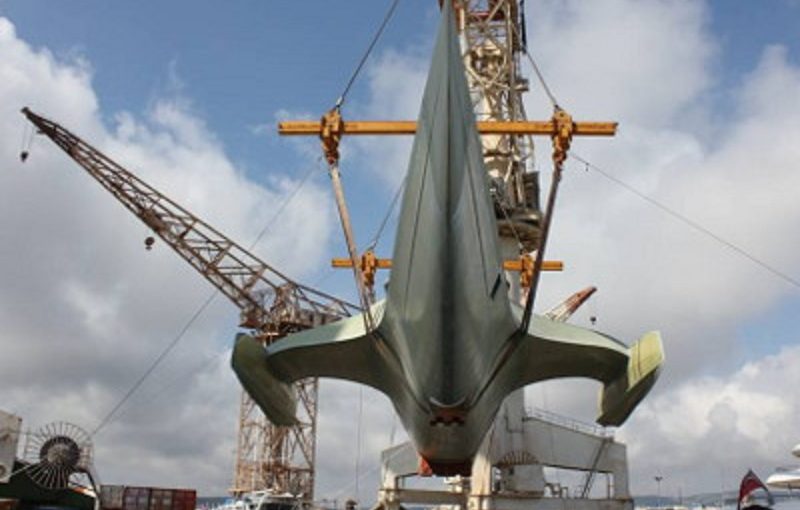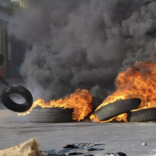Food insecurity could affect around 3.3 million Mozambicans by March
Mozambique: VTB bank, ‘obstacles’ put up by PGR threaten London hidden debts trial

FILE - An Ocean Eagle patrol vessel for Mozambique. [in file CoM]
The Russian bank VTB no longer has lawyers in the case of Mozambique’s hidden debts in British justice, creating uncertainty in the case also affected by the difficulties of the Attorney General’s Office in sharing official documents, it was said in London on Friday.
The procedural management hearing held at the London commercial court was the first in which the law firm Freshfields did not intervene on behalf of VTB, after it terminated the contract to comply with sanctions imposed on the Russian bank over the war in Ukraine.
Judge Robin Knowles said VTB remains part of the case and subject to the same obligations, so “it may at some point have consequences if it does not comply or cannot progress the case”.
“If that happens, if VTB wants, after a period of inactivity, to take an active part again, that will be considered at that time (…). It may or may not be too late, and there may be conditions,” he said.
Freshfields announced in March that it would stop representing VTB, which is subject to asset freeze sanctions and excluded from the banking transaction system, making payments to lawyers impossible. In a statement, it announced that it was refusing to represent “companies or individuals with close ties to the Russian state, with relations with the leadership regime in general and/or who play a role in supporting or facilitating current Russian military action.”
ALSO READ: Hidden debts: VTB Capital agrees to pay US$6 million in settlement with the US
Jonathan Adkin, a lawyer representing Mozambique’s public prosecutor’s office (PGR), which began court proceedings in London, noted the “growing uncertainty related to the VTB” in meeting the procedural timetable planned until the trial begins in October 2023. For his part, Adkin confirmed that the PGR will not be able to meet the planned deadline of sharing the documents that support the prosecution, asking for a three-month postponement, from September to December.
“It is a very complicated situation for Mozambique,” the British lawyer admitted, claiming that the collection of documents involves state departments, sub-departments and public entities such as Mozambique’s central bank. The lack of a sophisticated system of digital archiving of documents, the existence of a lot of information on paper, all in Portuguese, and the lack of financial resources create additional challenges to gather all the documentation.
“To give you an idea, Mozambique’s total budget is equivalent to 20% of the revenue of Credit Suisse, which shows the scale of the challenges in this exercise, not to mention issues of state secrecy,” he said.
Disclosure of the documents used by the respective parties to build their cases is mandatory before the trial begins.
“Main elephant in the room”
While acknowledging the uncertainty created by VTB’s absence, the lawyer representing Credit Suisse, Andrew Hunter, considered that the “main elephant in the room is the lack of disclosure by Mozambique”.
“It’s central to the case because you’re going to have more critical documents about employees, transactions, contracts, who intervened and that’s what we need for a fair trial,” he stressed.
ALSO READ: Russia’s VTB demands US$817.5 million from Mozambican state
Hunter lamented the constant “obstacles” raised by the PGR in accessing documents, be it the current criminal case being tried in Maputo over the hidden debts, or other documents, such as emails.
“It is April in 2022 and the Republic of Mozambique has nothing to show us, all it has done is identify obstacles that could prevent any disclosure. If that happens, we are going to have a very big problem in terms of the fairness of the trial,” he warned, opposing a delay in the planned timetable.
The shipping group Privinvest, through its lawyer Duncan Matthews, also criticised the “confusion” created by PGR’s delays, pointing out that the authorities have already had time to gather the documents bearing in mind that they have been investigating the scandal for seven years.
The lawyer also criticised the “absurd” lack of involvement of the current president of the Republic, Filipe Nyusi, who was arraigned for the proceedings but did not respond. “The former defence minister resists the disclosure of documents with the excuse that they are secret,” he criticised.
Sensitive to the “fundamental importance” of disclosure of the documents by all parties to the trial, Judge Robin Knowles refused to accede to Mozambique’s requested adjournment.
“Ultimately, if disclosure is inadequate, there could be very serious consequences, including sanctions, such as elimination” of parties violating the roadmap, the judge warned.
A further hearing is scheduled for mid-June to assess progress and the possible need to readjust the trial schedule.
Initiated by the PGR on behalf of the Republic of Mozambique in 2019, the lawsuit in the British courts seeks to try to cancel the $622 million debt owed by state-owned company Proindicus to the Credit Suisse bank and obtain compensation to cover all losses resulting from the hidden debts scandal.
At issue are the hidden debts of the Mozambican state of around two billion dollars (1.8 billion euros) contracted between 2013 and 2014 in the form of loans with the British subsidiaries of investment banks Credit Suisse and VTB on behalf of the Mozambican state companies Proindicus, Ematum and MAM.
ALSO READ: Angola confirmed to be operating HSI 32 interceptors
The financing was intended for the purchase of tuna fishing boats and for maritime security equipment and services provided by Privinvest companies.












Leave a Reply
Be the First to Comment!
You must be logged in to post a comment.
You must be logged in to post a comment.